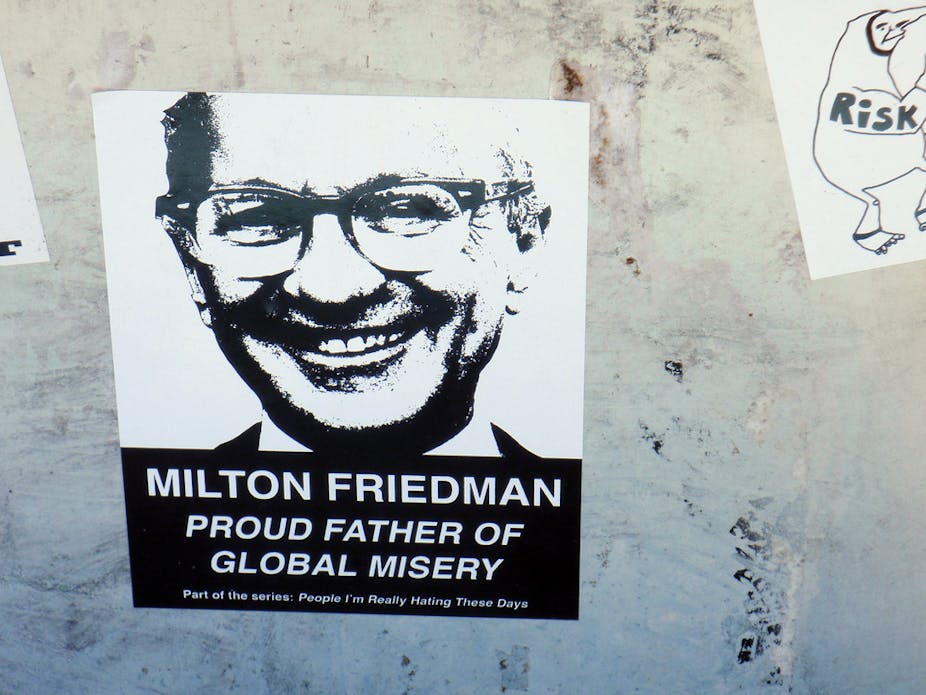A funny thing happened on the way to this year’s Australian Conference of Economists.
A survey was conducted of the policy opinions of members of the Economic Society of Australia (ESA). Far from conforming to the stereotype of economists as free market, “neo-liberal” ideologues, they turned out to be a bunch of interventionist social democrats.
The responses to the survey will do little to ease the reputation of economists for giving “on the one hand…” responses to public policy questions. Economists are shown to be divided on many issues, with some questions eliciting a high percentage of “unsure/neither agree or disagree” responses.
This may be partly due to the poor wording of many of the questions, but it is also consistent with the importance of underlying assumptions and the economist’s frequently employed “all else equal” caveat.
So what policy opinions do members of the ESA hold? All economists support free trade, right? Not so fast! Only 59% agreed with unilateral reductions in trade barriers, with 27% disagreeing. Nearly 60% of respondents agreed with “some restrictions on the free flow of financial capital”, with only 23% disagreeing. So free trade is popular for goods and services, but not so much for capital.
You might have expected that most economists, following Milton Friedman, view inflation as “always and everywhere a monetary phenomenon.” Yet only 40% of respondents agreed with the proposition that “inflation is caused primarily by growth in the money supply”.
An equal number disagreed. The survey could not even summon a majority behind the view that “the Reserve Bank of Australia should focus on a low rate of inflation rather than on employment or economic growth”. Over a third disagreed, so ESA members could hardly be characterised as anti-inflation zealots.
Three quarters of respondents agreed that “a substantial increase in public spending is an appropriate response to a severe recession.” This question failed to distinguish between a discretionary and non-discretionary increase in government spending, but if the question was interpreted as the former, then the society is overwhelmingly made up of old fashioned Keynesians.
If the latter, then this is an empirical observation, not a statement of policy preference. While monetary policy was equally favoured as a recession-fighting tool, this equal footing is inconsistent with the view that monetary policy has a distinct advantage over fiscal policy when it comes to aggregate-demand management.
You might also have expected that economists would favour cutting taxes on income and capital in favour of increasing taxes on consumption, but these propositions found agreement on the part of only around 40% of respondents. An “excess profits” tax on mining was supported by three-quarters, despite the problems entailed in defining “excess profits”.
But why not a similar tax on other industries? 44% of respondents agreed that the government should pursue policies to make the distribution of income in Australia “more equal”. How much “more equal” we can only guess.
Around two-thirds of respondents agreed that “competition laws should be enforced vigorously to reduce market power from its current level.” This is a surprising level of agreement for a proposition that has no analytical or empirical content. Doesn’t it go without saying that the law should be enforced? What is “market power” and who has it? Is the Australian Competition and Consumer Commission (ACCC) not doing its job properly? What “level” should “market power” be reduced to? The 22% who said they were neutral on this empty generalisation surely had it right.
Three-quarters supported jail sentences for “executives found guilty of participating in price fixing”, which will be music to the ears of a power-hungry ACCC. A surprisingly large 48% thought that price discrimination based on a “consumer’s search, browser or purchase history should be illegal”. Perhaps the offending online retailers should go to jail too?
Economists are supposed to be in favour of competition, but they’re not, it seems, between levels of government. Only 35% disagreed with the view that “increasing federal government power relative to that of the states leads to increased economic efficiency”.
So why don’t our economists conform to the free market, “neo-liberal” stereotype? The survey didn’t ask about voting intention, but a survey of the membership of the broadly equivalent American Economic Association (AEA) by Dan Klein and Charlotta Stern found that 58% of respondents were Democrat voters. Only 23% identified as Republicans.
This points to an obvious selection bias in surveys of this type. Klein and Stern surveyed AEA members’ views on 18 specific forms of government intervention. Only 8% of respondents were found to be supporters of free-market principles and less than 3% were found to be strong supporters. Given the politics of the majority of respondents, that is not surprising, although even self-identified Republicans were only lukewarm supporters of free markets.
A related selection bias arises from the fact that if you are an economist interested in public policy, you are more than likely employed in either the public sector or a university. This was true for two-thirds of the respondents to the ESA survey. Only one-quarter were employed in the private sector. The survey may have been representative of those ESA members interested in public policy, but may not be representative of economics and all its sub-disciplinary perspectives.
The Nobel prize-winning economist FA Hayek said that “the curious task of economics is to demonstrate to men how little they really know about what they imagine they can design”. The ESA survey results underscore the wisdom of that observation.

